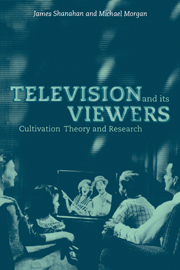Book contents
- Frontmatter
- Contents
- List of figures
- List of tables
- Foreword by George Gerbner
- 1 Origins
- 2 Methods of Cultivation: Assumptions and Rationale
- 3 Methods of Cultivation and Early Empirical Work
- 4 Criticisms
- 5 Advancements in Cultivation Research
- 6 The Bigger Picture
- 7 Mediation, Mainstreaming and Social Change
- 8 How does Cultivation “Work,” Anyway?
- 9 Cultivation and the New Media
- 10 Test Pattern
- Methodological Appendix
- References
- Index
10 - Test Pattern
Published online by Cambridge University Press: 22 September 2009
- Frontmatter
- Contents
- List of figures
- List of tables
- Foreword by George Gerbner
- 1 Origins
- 2 Methods of Cultivation: Assumptions and Rationale
- 3 Methods of Cultivation and Early Empirical Work
- 4 Criticisms
- 5 Advancements in Cultivation Research
- 6 The Bigger Picture
- 7 Mediation, Mainstreaming and Social Change
- 8 How does Cultivation “Work,” Anyway?
- 9 Cultivation and the New Media
- 10 Test Pattern
- Methodological Appendix
- References
- Index
Summary
And what is honoured is cultivated, and that which has no honour is neglected.
Plato, RepublicCultivation's Narrative
Throughout this book, we have attempted to explicate and assess cultivation research as even-handedly as possible. Obviously, we're biased because we do cultivation research, but we have tried to be fair (as far as possible) about both its flaws and achievements. Certainly, the cultivation paradigm is not perfect, but we have tried to demonstrate that it has a great deal to commend it, and that it offers a valuable, practicable and critical lens through which to view the complex dynamics of media, culture and society. It tells us some important things about how we perceive the world in which we live (and which we construct), as well as about the consequences of our cultural policies. As we have offered rebuttals both to some familiar critiques and to some others that have been floating around unanswered for years, we have tried to defend cultivation analysis vigorously in these pages, without (we hope) being overly defensive.
In any case, most accounts that admit to bias sooner or later structure themselves as stories. Though it is perhaps unusual for the academic monograph to conclude with a narrative recounting of a field of research, that is what we propose to do here. As usual, most of the good stories have already been taken, so we hope that we don't raise too many hackles if we adopt and adapt from some classics to help make our point.
Information
- Type
- Chapter
- Information
- Television and its ViewersCultivation Theory and Research, pp. 220 - 237Publisher: Cambridge University PressPrint publication year: 1999
